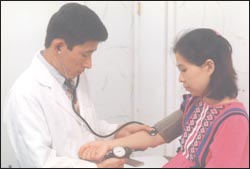
- 질, 항문, 젖꼭지 등에서 피가 날 때
- 얼굴, 손발이 부을 때
- 체중이 갑자기 많이 감소되거나 증가될 때
- 머리가 아플 때
- 시야가 나빠지거나, 불빛 같은 것이 눈에서 번쩍이거나, 실제로는 없는 점 등이 시야에 나타날 때
- 배가 아플 때
- 구토할 때
- 열이 날 때
- 소변과 비슷한 따뜻한 양수가 질에서 흘러나올 때
- 질에서 출혈될 때
- 그 외
Copyright ⓒ 2014 John Sangwon Lee, MD., FAAP
Pregnancy complications and regular pregnancy physical examinations 임신 합병증과 정기 임신검진

During pregnancy, receive regular pregnancy checkups according to the doctor’s instructions.
![]()
Most pregnant women get pregnant normally and deliver healthy babies safely and naturally without complications during pregnancy.
However, some pregnant women may experience pregnancy complications during pregnancy.
Full-term infants can be delivered by natural delivery at full term, premature infants can be delivered early, or overmature infants can be delivered after the due date of delivery has elapsed.
Babies born at 37-41 weeks of gestation are called term babies, babies born 37 weeks before are called premature babies, and babies born after 41 weeks of gestation are called overmature babies.
Premature or overmature babies are managed as much as possible, and during pregnancy, miscarriage, miscarriage, anemia, cystitis and nephritis, or urinary tract infections, preeclampsia and eclampsia, anemia and jaundice in the fetus caused by inadequate Rh, and sexual intercourse Infectious sexually transmitted diseases that can be transmitted mainly-gonorrhea, syphilis, Herpes viral vulvitis and vaginitis, hepatitis B, AIDS, other types of infectious sexually transmitted diseases, rubella, chickenpox, cytomegalovirus infection, pregnancy and toxoplasma.
It is important to prevent pregnancy complications such as fungus, yeast infection, listeriosis, and infectious diseases caused by group B research bacteria in advance. And it is also very important to diagnose and treat early pregnancy complications that occur during pregnancy. Certain types of pregnancy complications can become more and more unknowingly worse and endanger the life of the pregnant woman and the fetus. In order to prevent complications from occurring during pregnancy and to diagnose and treat the complications that have already occurred, you must receive regular pregnancy check-ups according to the doctor’s instructions until the pregnancy is established and delivered. Regular pregnancy check-ups are done at that time, depending on the pregnant woman, problems or complications during pregnancy, and the diseases that the pregnant woman has. When undergoing regular pregnancy checkups, the doctor in charge will learn more about the pregnant woman’s past and present medical history, the family history of the pregnant woman and her husband, etc., measure blood pressure, weight and height, check blood and urine, and find out if there are any complications of pregnancy see. When you receive a regular pregnancy check-up during pregnancy, you can check whether changes in the body during pregnancy are normal or abnormal and whether pregnancy complications or other diseases are occurring.
If you have any of the following symptoms during pregnancy, you should ask your doctor right away if such symptoms are caused by pregnancy complications.
- When bleeding from the vagina, anus, nipples, etc.
- When the face, hands and feet are swollen
- When you lose or gain a lot of weight suddenly
- When your head hurts Poor vision, flashes of light in your eyes, or spots that don’t actually appear in your field of view
- When your stomach hurts
- When vomiting
- When you have a fever When warm amniotic fluid, similar to urine, flows out of the vagina When bleeding from the vagina etc. Copyright ⓒ 2014 John Sangwon Lee, MD., FAAP
“부모도 반의사가 되어야 한다”-본 사이트의 내용은 여러분들의 의사로부터 얻은 정보와 진료를 대신할 수 없습니다.
“The information contained in this publication should not be used as a substitute for the medical care and advice of your doctor. There may be variations in treatment that your doctor may recommend based on individual facts and circumstances.
“Parental education is the best medicine.“